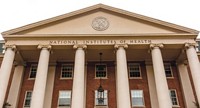Advertisement
Grab your lab coat. Let's get started
Welcome!
Welcome!
Create an account below to get 6 C&EN articles per month, receive newsletters and more - all free.
It seems this is your first time logging in online. Please enter the following information to continue.
As an ACS member you automatically get access to this site. All we need is few more details to create your reading experience.
Not you? Sign in with a different account.
Not you? Sign in with a different account.
ERROR 1
ERROR 1
ERROR 2
ERROR 2
ERROR 2
ERROR 2
ERROR 2
Password and Confirm password must match.
If you have an ACS member number, please enter it here so we can link this account to your membership. (optional)
ERROR 2
ACS values your privacy. By submitting your information, you are gaining access to C&EN and subscribing to our weekly newsletter. We use the information you provide to make your reading experience better, and we will never sell your data to third party members.
Policy
Trump orders US government agencies to cut advisory panels
Directive exempts committees that review research grants
by Cheryl Hogue
June 18, 2019
US President Donald J. Trump is ordering federal agencies to slash the number of advisory committees they depend on for counsel, including for science expertise.

In a June 14 executive order, Trump directed each agency to eliminate by Sept. 30 at least a third of its federal advisory committees that were not established by Congress in federal laws. Trump also ordered the White House Office of Management and Budget to prepare a plan to terminate committees that Congress created but “whose continued operations no longer serve the public interest.”
The order carves out two notable exceptions to this downsizing. One is for panels that approve extramural research grants or cooperative agreements for agencies such as the National Institutes of Health.
The other exception is for committees of outside experts that “provide scientific expertise to support agencies making decisions related to the safety or efficacy of products to be marketed to American consumers.” This would likely apply to the Food and Drug Administration’s pharmaceutical advisory committees and the Environmental Protection Agency’s Scientific Advisory Panel that reviews pesticides.
“Advisory committees help the government become better informed, and making smart decisions should not be seen as optional or dispensable,” says Rush Holt, chief executive officer of the American Association for the Advancement of Science.
“Rather than a random cap on the number of federal committees, agency decisions should be needs-based coupled with criteria for elimination,” says Glenn Ruskin, spokesperson for the American Chemical Society. ACS publishes C&EN. Exceptions notwithstanding, “the impulse behind this executive order appears not to be to help agencies to meet their mission,” says Genna Reed of the Union of Concerned Scientists’ Center for Science and Democracy. Instead, it appears to “undermine the way science informs decision-making,” she says.
The order leaves 11 of the 22 advisory committees that advise the EPA eligible for the chopping block, Reed tells C&EN. They include the Board of Scientific Counselors, which advises the agency on its internal research; the Children’s Health Protection Advisory Committee; and the National Environmental Justice Advisory Council.
The US General Services Administration, which oversees these panels, says there are approximately 1,000 federal advisory committees. Some 50 departments, agencies, and other federal entities have these committees. The Department of Health and Human Services, which includes the NIH and FDA, has 269 advisory panels, according to the GSA. The NSF has 52, and the Defense Department has 47.



Join the conversation
Contact the reporter
Submit a Letter to the Editor for publication
Engage with us on Twitter